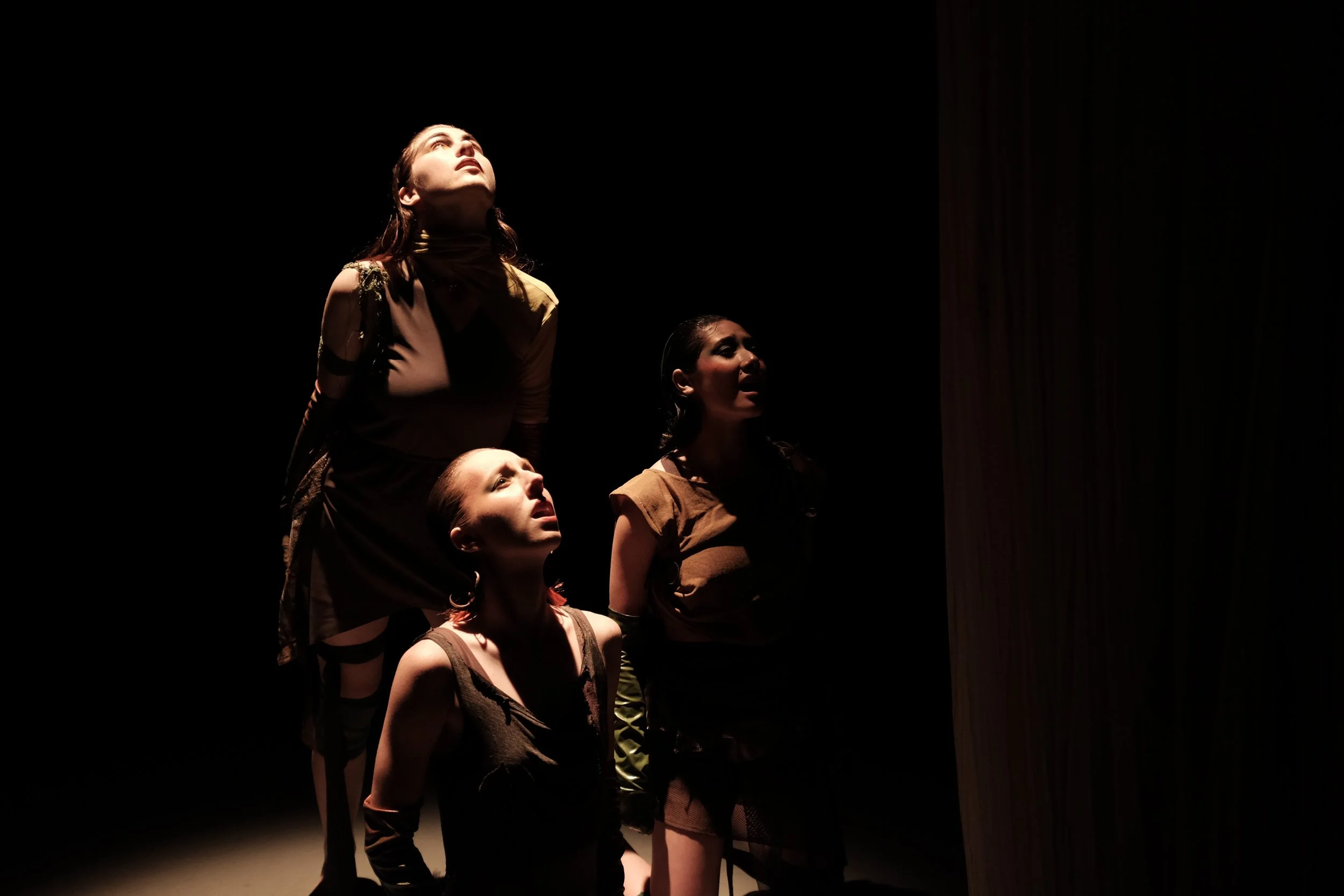Theatre reviews: Dark, digital clown humour and an enchanting amphibian world as rEvolver Festival opens
@interWEBBED’s absurd comedy escalates into dystopian Black Mirror-esque territory, while Soft tongues: a bioacoustic opera builds an intoxicating froggy soundscape
Lauren Brady in @interWEBBED. Photo by Joel Sims -
Upintheair Theatre presents the rEvolver Festival at The Cultch to June 2
MULTIMEDIA ELEMENTS, DISEMBODIED voices, and the meeting of our senses with technology are some of the common building blocks in two of this year’s rEvolver Festival offerings.
Solo clown show @interWEBBED traps its protagonist and the viewer in the chaotic pursuit of online validation, exploring the absurdity and humanity of our digital interactions. Soft tongues: a bioacoustic opera’s immersive and multispecies approach blends live music, movement, and digital distortion to conjure up an amphibian realm. In both shows, the distance between performer and technology becomes imperceptible, and the gap between performer and audience is excitingly thin.
@interWEBBED’s clown is named Ted Bamo, and they have lost their beloved dog Steve. Amid sad piano music and a growing pile of snotty tissues, Ted takes a break from crying, turns to the audience and declares “I want friends,” eliciting a sympathetic chorus of “aww’s”.
Fortune seems to smile upon the clown with the sudden arrival of a mysterious, intelligent social media platform in the form of a box. Enchanted by the glittering promise of endless friends, the eager Ted mindlessly signs the box’s sketchy list of user terms and conditions. What could go wrong?
In lively performer’s Lauren Brady’s first solo clown show, directed by renowned Canadian clown Michael Kennard, you’re thrust into a ride that quickly turns into a digital nightmare full of charming clowning, dark humour, and of course, audience participation.
On stage, Ted’s only foil is a sterile white box, and the equally sterile, automated voice that comes out of it. The voice initially addresses the clown dryly, but gradually takes on a scarily authoritative tone as it starts to force them to change every aspect of themselves to become more algorithm-friendly. Making us complicit, the voice eventually prompts the audience to use our phones, spamming emojis to react in real time to whatever Ted is doing.
As the show’s tone escalates into meta and Black Mirror-esque territory, a wave of digital noise and lights barrages with notification pings, camera shutter clicks, strobe neon, and projections on the white box, immersing us, just like Ted, in the futile pursuit of online validation. Brady’s adept physical comedy—repeatedly striking elaborate poses for profile photos or struggling to punch in a password—grounds us in the light absurdity of it all.
Toward the end, @interWEBBED’s broad humour grows more dystopian and skin-crawling, resulting in occasional disjointedness. However, Brady manages to maintain the emotion through exaggerated facial expressions and eyes that constantly seek connection with the audience. Even with the makeup wiped off and innocence lost, there’s the same touching sense of desperation from when we first meet Ted.
Built on clowning, a style that thrives on audience validation and interaction, @interWEBBED intuitively understands—and makes the case for—our yearning for connection as deeply and inherently human.
The choir in Soft tongues: a bioacoustic opera. Photo by Taha Nejad
In Soft tongues, interdisciplinary artist Jami Reimer distills something beyond the human. Emerging from a residency with biologists in Brazil, the show mixes field recordings, original songs, choral arrangements, and improvisations into a bioacoustic opera. Using a multimedia approach, Soft tongues beckons immersion in the wet, lush, and murky world of frogs, both living and extinct.
Like the animals that are loudest at night, Reimer appears out of darkness. Wearing a camou-print cape, she blends into the earth-toned fabrics draping under her electronic musical equipment and the off-white scrim that hangs onstage.
Softly illuminated by the glow of her mixer, which she uses to manipulate sound throughout the show, she makes eye contact with the crowd as her voice softly emerges. Ranging from talk-singing to haunting falsettos, her vocal performance calls to mind the hypnotic qualities of singers like Björk or FKA twigs. Here, however, this singular voice erupts to become part of a larger whole.
That’s true for the other seven performers who join Reimer onstage. Acting as a chorus of amphibians, they make their presence known with chirps, warbles, screams, croaks, and clicks—imitating both the recordings and each other. Their staggered voices envelop the audience from all directions before booming powerfully in unison.
Throughout the performance, froggy and human voices mingle and jumble. Lush ambience morphs into bombastic, harsh electronics, and mellow singing swells into operatic belts. Within the intoxicating soundscape, the voices of scientists—and occasionally of Reimer—anchor the listener with frog facts. Audio clips and lyrics briefly describe processes like skin-moulting, mating, and dying, loosely breaking the show into sections that mirror life cycles.
Each of these sections feature distinct choreography; at one point, when a disembodied human voice dryly describes how frogs’ “vocal sacs expand to change their size,” the chorus appears as shadows from behind the scrim, forming the shapes of giant frogs and moving to the rhythm of percussive electronic croaks.
Blending movement and lighting with live and recorded sound, and throwing in some digital distortion, Soft tongues creates something unique—a playful, eco-centric, and eerily enchanting dive into natural and technological inspirations. ![]()














